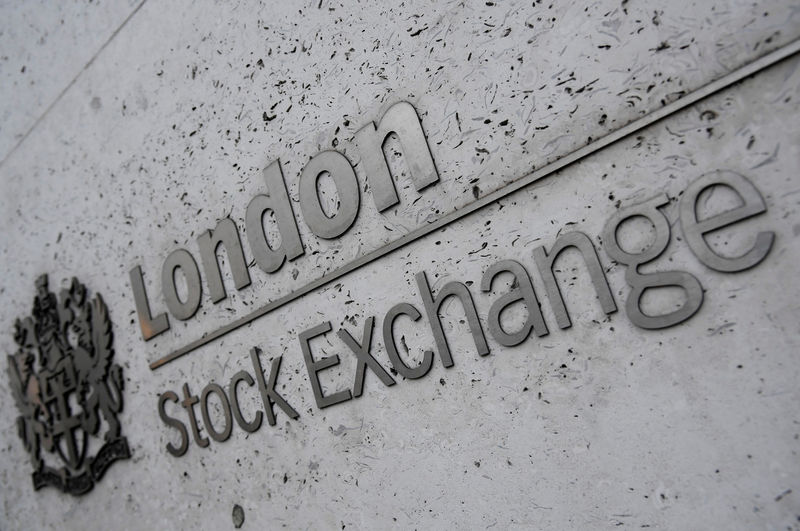By Helen Reid
LONDON (Reuters) - An escalating U.S.-China trade spat sent UK stocks tumbling on Friday, sinking oil and mining shares in a broad reversal across European markets.
U.S. President Donald Trump announced tariffs on $50 billion worth of Chinese imports and Beijing threatened to respond in kind, stopping the FTSE 100's earlier rally in its tracks and sealing the fourth straight week of losses for Britain's top share index.
The FTSE 100 (FTSE) ended the day down 1.7 percent, resulting in a 0.6 percent loss on the week.
One bright spot, however, was Rolls-Royce (L:RR), which jumped 7.6 percent after the engine maker issued ambitious mid-term goals.
Elsewhere, the mid-cap FTSE 250 (FTMC) fell 1.5 percent and suffered its worst weekly fall in three months.
Mining stocks, which are highly sensitive to trade tensions, were hard hit. The pan-European basic resources sector (SXPP) lost 3.3 percent in its worst daily fall since November 2016.
Copper hit a one-week low as trade tensions added pressure to the commodity already dented by worries over slowing growth in top metals buyer China.
Rio Tinto (L:RIO), Glencore (L:GLEN), BHP Billiton (L:BLT), and Anglo American (L:AAL) were top fallers, down by 4.1 to 4.5 percent.
Heavyweight oil majors BP (L:BP) and Royal Dutch Shell (L:RDSa) fell 3.2 to 3.5 percent as oil prices fell sharply ahead of an OPEC meeting in Vienna next week.
A more dovish than expected interest rate outlook from the ECB had sent shares across Europe surging on Thursday, with the FTSE 100 also benefiting thanks to its heavy weighting in high dividend-yielding, interest rate sensitive stocks.
Bank stocks were a big drag on Friday as sentiment around international trade and U.S.-China relations soured.
The sector was already weak post-ECB as investors priced in a longer wait before an ECB rate hike. Banks suffer from negative interest rates which eat into their lending margins.
ROLLS ROYCE, TESCO SHINE AMID SELLOFF
Rolls-Royce's gains took them to a four-year high.
"The company's new mid-term ambition of more than 1 pound per share in free cash flow implies more than 1.8 billion pounds ($2.4 billion) in total free cash flow. This is well ahead of 2020 company compiled consensus," said Goldman Sachs (NYSE:GS) analysts.
"Investor discussions had focused on whether 2020 was peak free cash flow, therefore this 1.8 billion figure is a clear positive."
Tesco (L:TSCO) shares also rose, climbing 2 percent after Britain's biggest retailer reported strong results, saying a drive to lower prices had boosted its quarterly sales.
"Continued upbeat UK retail momentum, accelerating share gains at Booker and reducing pressures in Thailand all make for an upbeat start to Tesco's 18/19," said Jefferies analysts.
Consumer staples stocks such as Unilever (L:ULVR) and Diageo (L:DGE) also resisted the selloff as high dividend yielding "bond proxy" sectors benefited from the ECB pushing back rate rises.
Among mid-caps, Indivior (L:INDV) plunged 20 percent to a two-month low after its rival Dr Reddy's Laboratories (NS:REDY) got U.S. FDA approval for a generic version of its opioid addiction treatment, Suboxone Film.
"Dr Reddy's still does not have a settlement, but we wouldn't rule out the possibility of an at risk launch, as the company has previously disclosed that it is comfortable about its IP position on this product," said Goldman Sachs analysts.
Overall UK shares have had a strong run in recent weeks, outperforming all European benchmarks in May, as investors warmed once again to the market. Strong retail sales figures on Thursday helped fuel nascent optimism on the domestic economy.
Analysts have also been revising up their earnings estimates for the market.
(Graphic: ANALYSTS REVISIONS FTSE 100 - https://reut.rs/2yei97P)
